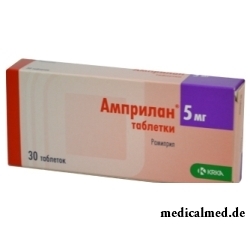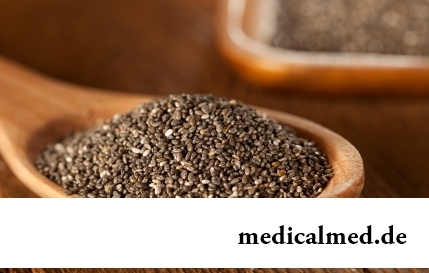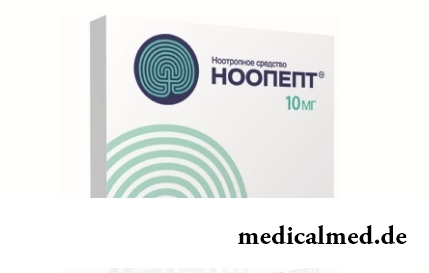





Amprilan
Application instruction:
 Amprilan – drug with vazodilatiruyushchy, hypotensive action.
Amprilan – drug with vazodilatiruyushchy, hypotensive action.
Form of release and structure
Dosage form of release of Amprilan – a tablet: flat, oval, with a facet, almost white or white (on 1,25/10 mg), light yellow (on 2,5 mg), pink with visible impregnations (on 5 mg) colors (on 10 pieces in blisters, in a cardboard pack of 3, 6 or 9 blisters; on 7 pieces in blisters, in a cardboard pack of 2, 4, 8, 12 or 14 blisters).
Structure of 1 tablet:
- Active ingredient: ramiprit – 1,25, 2,5, 5 or 10 mg;
- Additional components (1,25/2,5/5/10 mg): the stearylfumarating sodium – 1/2/1,3/2,6 mg, hydrosodium carbonate – 1,25/2,5/5/10 mg, sodium of a kroskarmelloz – 2/4/2,6/5,2 mg, monohydrate of lactose – 79,5/155/94/193,2 mg, prezhelatinizirovanny starch – 15/30/19,5/39 mg, mix of dyes "PB 22886 Yellow" (monohydrate of lactose, yellow dye iron oxide (E172)) – 0/4/0/0 mg, mix of dyes "PB 24899 Pink" (monohydrate of lactose, red dye iron oxide (E172), yellow dye iron oxide (E172)) – 0/0/2,6/0 mg.
Indications to use
- Chronic heart failure, including arisen throughout 2-9 in the afternoon after a myocardial infarction (along with other medicines);
- Arterial hypertension;
- Diabetic nephropathy and not diabetic nephropathy at chronic diffusion diseases of kidneys (clinical/preclinical stages), including a chronic glomerulonephritis with the expressed proteinuria;
- Reduction of probability of development of a stroke, myocardial infarction and cardiovascular mortality at high cardiovascular risk, including patients with the confirmed coronary heart disease (with/without myocardial infarction in the anamnesis), patients after transferring of transdermal transluminal coronary angioplasty, coronary shunting, with a stroke in the anamnesis, occlusal damages of peripheral arteries.
Contraindications
Absolute:
- Quincke's disease (idiopathic/hereditary/connected with the previous therapy by inhibitors of an angiotensin-converting enzyme) in the anamnesis;
- Bilateral stenosis of renal arteries (hemodynamically significant);
- Primary hyper aldosteronism;
- Carrying out hemodialysis;
- States after transplantation of kidneys;
- Stenosis of an artery of the only kidney;
- Aortal/mitral stenosis (hemodynamically significant; there is a probability of excessive lowering of arterial pressure (ABP) with the subsequent renal failure);
- The expressed arterial hypotension (at the ABP it is less than 90 mm hg);
- Unstable hemodynamics;
- Renal failure (with clearance of creatinine <20 ml/min.);
- Dekompensirovanny chronic heart failure;
- Hypertrophic subaortic stenosis;
- The combined use with glucocorticosteroids, non-steroidal anti-inflammatory drugs, cytostatics and/or immunomodulators at treatment of a nephropathy;
- Intolerance galactose/syndrome of glyukozo-galaktozny malabsorption / lactose intolerance;
- Age up to 18 years (the safety profile for this age group of patients is not studied);
- Period of pregnancy and lactation;
- Hypersensitivity to components of drug or other inhibitors of an angiotensin-converting enzyme.
Relative (Amprilan appoint with care in the presence of the following diseases / states):
- Ventricular disturbances of a rhythm in a heavy current;
- Defeats of cerebral/coronary arteries in a heavy current (there is a danger of decrease in a blood-groove at excessive decrease in the ABP);
- The states proceeding with decrease in volume of the circulating blood (including diarrhea, vomiting);
- Diabetes mellitus;
- Hyperpotassemia/hyponatremia (including arisen because of use of diuretics and observance of a diet with restriction of consumption of table salt);
- Malignant arterial hypertension;
- Diseases of connecting fabric of system character;
- Unstable stenocardia;
- Mitral/aortal stenosis;
- Chronic heart failure (the IV functional class on NYHA classification);
- Oppression of a marrowy hemopoiesis;
- Dekompensirovanny pulmonary heart;
- Liver/renal failure;
- The combined desensibilizing therapy by allergens (for example, poison of Hymenoptera);
- States before the procedure of an aferez lipoproteins of low density;
- Carrying out a hemodialysis with high-flowing polyacrylonitrile membranes (there is a probability of emergence of anaphylactoid reactions);
- Advanced age.
Route of administration and dosage
Drug Amprilan should be accepted inside, washing down with liquid in enough. It is not necessary to chew tablets. Meal does not influence efficiency of drug.
The course of treatment is long, is defined individually by the specialist. Also the doctor selects a drug dose, it depends on efficiency of therapy and portability of drug.
The recommended scheme of reception of Amprilan:
- Arterial hypertension: an initial dose – 2,5 mg in 1 reception. With a break of 7-14 days increase in a dose is possible twice. The average supporting daily dose – 2,5-5 mg, maximum – 10 mg. At the previous reception of diuretics their cancellation or a dose decline not less, than in 3 days prior to Amprilan's appointment is necessary;
- Chronic heart failure: an initial dose – 1,25 mg in 1 reception. With a break of 7-14 days increase in a dose is possible twice. An average maximum dose – 10 mg a day. At the previous reception of high doses of diuretics decrease in their dose to Amprilan's appointment is necessary;
- The heart failure which arose throughout 2-9 in the afternoon after an acute myocardial infarction: an initial dose – 5 mg in 2 receptions (it is necessary to take one pill of 2,5 mg in the morning, the second – in evening). At bad portability of Amprilan (excessive decrease in the ABP) the single dose needs to be reduced twice at preservation of frequency rate of administration of drug. Afterwards, depending on reaction of the patient, the dose can be increased to the previous level with a break 1-3 days again. Later the daily dose can be accepted in 1 reception. The maximum dose – 10 mg a day. At bad portability of a daily dose of 5 mg therapy should be cancelled;
- Diabetic nephropathy and nephropathy at chronic diffusion diseases of kidneys: an initial dose – 1,25 mg in 1 reception. The dose can be gradually increased to 5 mg a day (its increase twice is recommended each 14 days);
- Decrease in risk of developing of a stroke, myocardial infarction and cardiovascular mortality: an initial dose – 2,5 mg in 1 reception. The dose has to be gradually increased to 10 mg (its increase twice in 7 days, then in 14-21 days is recommended).
Recommendations about Amprilan's reception by separate groups of patients:
- Patients with functional disturbances of a liver: an initial daily dose – 1,25 mg in 1 reception, maximum – 2,5 mg in 1 reception;
- Patients with functional disturbances of kidneys (with clearance of creatinine it is less than 30 ml/min.): an initial daily dose – 1,25 mg, maximum – 5 mg;
- The elderly patients (of 65 years) accepting diuretics: the dose is selected individually on the basis of the ABP level at careful monitoring of a state.
Side effects
Possible side reactions during Amprilan's reception (> 1/10 – it is very frequent;> 1/100-<1/10 – it is frequent;> 1/1000-<1/100 – infrequently;> 1/10 000-<1/1000 – it is rare; <1/10 000, taking into account single messages – it is very rare):
- Respiratory system: often – the unproductive dry cough amplifying in a prone position and at night (it is in most cases observed at women and non-smoking patients), bronchitis, sinusitis, short wind; seldom – pharyngitis, a nose congestion, a bronchospasm (including an aggravation of symptoms at bronchial asthma);
- Nervous system: often – a headache, weakness; seldom – a depression, dizziness, increased fatigue, uneasiness, nervousness, balance disturbance, a tremor, confusion of consciousness, frustration of a dream, motive concern; very seldom – paresthesias, a parosmiya, an ischemic stroke, the tranzitorny ischemic attacks, disturbance of concentration of attention, brain ischemia;
- Cardiovascular system: often – the expressed decrease in the ABP (as a rule, at the beginning of a course, at purpose of diuretic or increase in a dose), syncopal states, orthostatic hypotension; seldom – feeling of heartbeat, peripheral hypostases, arrhythmia, stenocardia; very seldom – myocardium heart attack/ischemia, Reynaud's syndrome, strengthening of disturbances of blood circulation at the stenosing vascular defeats, a vasculitis, rushes of blood to face skin, tachycardia;
- Urinogenital system: seldom – decrease in a libido, passing impotence, increase in amount of the emitted urine, functional disturbances of kidneys up to an acute renal failure, increase in concentration of creatinine/urea, strengthening of earlier existing proteinuria; very seldom – a gynecomastia;
- Skeletal and muscular system: often – muscular spasms, a mialgiya; seldom – an arthralgia;
- Alimentary system: often – an inflammation of a mucous membrane of digestive tract, feeling of discomfort in a stomach, digestion disturbances, nausea, diarrhea, dyspepsia, vomiting; seldom – increase in concentration of bilirubin/activity of liver enzymes, an acute liver failure, cholestatic jaundice, hepatocellular defeats, cholestatic hepatitis, abdominal pains, dryness of a mucous membrane of an oral cavity, a lock, gastritis, pancreatitis (including in extremely exceptional cases with a lethal outcome), an intestinal Quincke's disease, anorexia, a loss of appetite; very seldom – aphthous stomatitis, a glossitis;
- Integuments: often – makulopapulezny skin rash; seldom – increase in perspiration (at decrease in the ABP), a skin itch; very seldom – a pemphigus, a makulopapulezny erythema and a dieback, a mnogoformny erythema, a toxic epidermal necrolysis, Stephens-Johnson's syndrome, an alopecia, psoriasiform, lichenoid and pemfigoidny defeats of mucous covers / skin, deterioration in a course of psoriasis; very seldom – a photosensitization, urticaria, exfoliative dermatitis, онихолизис;
- Sense bodys: seldom – conjunctivitis, visual frustration (including an illegibility of visual perception), a hearing disorder, disturbances of taste/sense of smell (including metal smack, temporary/partial loss of flavoring feelings);
- Laboratory indicators: seldom – a hyperpotassemia, a neutropenia/hypohaemoglobinaemia, thrombocytopenia and an erythropenia with moderated (in certain cases expressed) a current, increase in activity of enzymes of a pancreas; very seldom – a hyponatremia, a proteinuria (though, as a rule, inhibitors of an angiotensin-converting enzyme reduce the previous proteinuria) or increase in a diuresis (in a combination with deterioration in cardiac performance), hemolitic anemia, a marrow depression, a pancytopenia, an agranulocytosis;
- Allergic reactions: very seldom – an angioneurotic syndrome with involvement of a mucous membrane of eyes, lips, language, a throat and throat, anaphylactoid/anaphylactic reactions (poisons of insects), increase in concentration of antinuclear bodies;
- Others: seldom – a hyperthermia; very seldom – fever.
Special instructions
Before Amprilan's appointment it is necessary to estimate a functional condition of kidneys. Control of function of kidneys should be carried out carefully after transplantation of a kidney, at renal failures, heart failure, a stenosis of an artery of the only kidney or a bilateral stenosis of renal arteries.
In some cases at Amprilan's use development of cholestatic jaundice when which progressing there is a fulminantny necrosis of a liver, sometimes – with a lethal outcome is possible. At emergence of substantial increase of activity of hepatic transaminases or jaundices drug should be cancelled.
Symptomatic arterial hypotension against the background of uncomplicated arterial hypertension after reception of the first dose of Amprilan develops seldom. The probability of developing of arterial hypotension increases at the following diseases / states:
- Chronic heart failure in a heavy current (the recommended initial dose – 1,25 mg);
- The combined use with diuretics (the recommended initial dose – 1,25 mg; it is whenever possible necessary to lower a dose of diuretic in advance or to cancel it);
- The high risk of development of a hypovolemia connected with the insufficient use of liquid, diarrhea, vomiting or with the increased perspiration in the conditions of insufficient compensation of loss of liquid and salt (prior to therapy it is recommended to correct the volume of the circulating blood, in cases when these states become clinically significant, Amprilan's reception can be begun/is continued under medical observation in the minimum dose of 1,25 mg).
At obstruction of an output path of a left ventricle and a mitral/aortal stenosis it is necessary to appoint therapy with care.
At normal function of kidneys in cases when other complications are absent, the neutropenia develops seldom and has passing character (passes after Amprilan's cancellation).
Against the background of diseases of connecting fabric and the combined use with procaineamide, Allopyrinolum, immunosuppressive therapy, in particular at the existing renal failures, Amprilan it is necessary to apply carefully (because of risk of developing of the heavy infections which are not giving in to an intensive antibioticotherapia). Carrying out periodic control of leukocytes in blood is recommended. At emergence of any symptoms of infectious diseases (in the form of a pharyngalgia, temperature increase) it is necessary to consult immediately at the specialist.
During therapy development of a hyperpotassemia is possible. Treats major factors of risk: the advanced age, a renal failure, a diabetes mellitus some the accompanying states (decrease in volume of the circulating blood, a metabolic acidosis, a dekompensirovanny acute heart failure), the combined use with kaliysberegayushchy diuretics (эплеренон, Spironolactonum, amiloride, Triamterenum), the drugs of potassium or kaliysoderzhashchy substitutes of edible salt, other medicines promoting increase in plasma content of potassium (for example, heparin). The hyperpotassemia can lead to significant disturbances of a cordial rhythm, in certain cases from the death.
The combined use of Amprilan with kaliysberegayushchy diuretics, and also drugs of potassium and kaliysoderzhashchy substitutes of edible salt is not recommended.
Administration of drug should be interrupted in 12 hours prior to carrying out surgery, having warned the anesthesiologist about Amprilan's reception (the general anesthesia can lead to the expressed decrease in the ABP, in particular at use of means with hypotensive action).
In case of dry cough it is necessary to remember that it can be connected with the carried-out therapy (passes after Amprilan's cancellation).
At patients with tendency to development of allergic reactions against the background of holding a procedure of desensitization drug is appointed with care (possibly development of long, life-threatening anaphylactoid reactions; to avoid their emergence not less than one day before holding a procedure of desensitization Amprilan it is necessary to cancel). Also for the purpose of prevention of anaphylactoid reaction drug is cancelled before each procedure of an aferez lipoproteins of low density with use of high-flowing membranes.
When carrying out a hemodialysis with high-flowing membranes against the background of therapy by Amprilan anaphylactoid reactions were noted. In this regard use of a membrane of other type or use of hypotensive drug of other pharmakoterapevtichesky group is recommended.
Because of probability of development of such disturbances as confusion of consciousness, drowsiness, dizziness patients during therapy should be careful when performing potentially dangerous types of the works demanding bystry psychomotor reactions and a high concentration.
Medicinal interaction
At the combined use of Amprilan with some medicinal means / substances development of the following effects is possible:
- Angiotonic sympathomimetics (Norepinephrinum, Epinephrinum): decrease in anti-hypertensive action (at the combined use it is necessary to control carefully arterial pressure);
- Lithium drugs: development of reversible increase in serumal concentration of lithium;
- Ethanol: strengthening of the oppressing action on the central nervous system;
- Non-steroidal anti-inflammatory drugs (the TsOG non-selective inhibitors, for example, acetylsalicylic acid in the doses having antiinflammatory effect): decrease in hypotensive effect of Amprilan, increase in probability of functional disturbance of kidneys, increase in serumal content of potassium at already existing renal failures;
- Thiazide diuretics: increase in concentration of lithium and probability of its toxic influence;
- Antipsychotic means (neuroleptics), tricyclic antidepressants: strengthening of anti-hypertensive action and increase in risk of development of orthostatic hypotension (additive effect);
- Immunodepressants, cytostatic means, procaineamide, Allopyrinolum, glucocorticosteroids (at system use): increase in probability of emergence of a leukopenia;
- Glucocorticosteroids, тетракозактид: reduction of anti-hypertensive action (because of a liquid delay);
- Potassium drugs, kaliysberegayushchy diuretics, kaliysoderzhashchy substitutes of edible salt: interaction development (the combination is not recommended; regular control of plasma content of potassium and the ECG parameters is necessary);
- Some means applied when carrying out the general anesthesia: strengthening of anti-hypertensive action;
- Peroral hypoglycemic means, insulin (at a diabetes mellitus): strengthening of hypoglycemic effect, increase in tolerance to glucose (correction of their doses can be required);
- Gold drug (intravenous administration of an aurotiomalat of sodium): development of nitratopodobny reactions (in the form of nausea, vomiting, a dermahemia of the person, the expressed decrease in the ABP).
Terms and storage conditions
To store in the place, dry, unavailable to children, at a temperature up to 25 °C.
Period of validity of tablets:
- 1,25 mg – 2 years;
- 2,5/5/10 mg – 3 years.
Name of drug
Price
Drugstore
The stomach of the person not bad copes with foreign objects and without medical intervention. It is known that the gastric juice is capable to dissolve even coins.

So, you resolved to lose weight. And now you try to understand what to begin with: from exercise stresses or a diet? And how to make, h...
Section: Slideshow
Food with the increased content of sugar is attractive to most of people - it is scientifically confirmed fact. Business here not in intemperance or dissoluteness: the sweet food is associated since childhood with feeling of rest and safety which is felt by the kid, to...
Section: Articles about health
Beauty shop – the place which is associated only with positive emotions: joy, pleasure, relaxation. However visit of salon where work with biological material of clients, not always harmlessly is conducted. Today more than 100 pathogenic microorganisms who can catch in beauty shop including deadly to health are known....
Section: Articles about health
Iodine - one of thirty most important microelements in our organism. The main role of iodine consists in synthesis thyroid гормо...
Section: Articles about health
Aging — natural and inevitable process. Over time our skin loses elasticity, on it saggings are formed, the face form loses former clearness. The procedure of nitevy lifting (nitevy tightening) can successfully solve this problem. In order that it is better познако...
Section: Articles about health
Several decades ago the basil (the district khan, реан, Reagan) was considered as a part of the Caucasian or east cuisine, but today it strongly took the place on tables of Russians. Greens of this plant possess a strong, pleasant smell and specific fresh taste because of which it is included almost in all dry mixes of spicy herbs, and also give to meat and fresh fish dishes....
Section: Articles about health
Work of a brain is extremely complex and in many respects is not studied yet. It is confirmed also by the features of thought processes which are shown in...
Section: Articles about health
Weakness of an ankle joint – very widespread problem. Its existence is demonstrated by tendency to a podvorachivaniye of legs when walking on heels, frequent painful sprains, pain on average and anonymous toes even after small nagruzo...
Section: Articles about health
The chia plant, or the Spanish sage, is from South America. The indigenous people of the continent since ancient times used its seeds in food: small, but very nutritious kernels, in a form the reminding fasolina. Indians knew about useful properties of seeds of a chia, and applied them to maintenance of vitality and increase in endurance before serious exercise stresses....
Section: Articles about health
Many of us, probably, noticed more than once that from intellectual loadings at some point the brain as though "overheats" also "assimilation"...
Section: Articles about health
Dogrose – one of the most widespread adornment and medicinal plants growing practically in all territory of our country. To most of Russians it is a beautiful bush it is known, first of all, as a source of fruits, extremely vitamin-rich....
Section: Articles about health
For many spouses the question of planning of a family is one of the main. The problem of the choice of effective and safe contraceptives at the same time comes out on top. Russians still not often resort to operation of a vasectomy extremely popular in the USA, and also in some European and Asian countries. The reason is simple: most of men simply do not possess the complete information about specifics and effects of this procedure. Let's try to meet this lack and to acquaint readers about those...
Section: Articles about health
About influence of fasting days on an organism it is told much – both about advantages, and about shortcomings. It is considered that fasting day...
Section: Articles about health
A lot of things depend on a condition of a backbone in a human body, a backbone - not only a support for a body, it also a receptacle for a spinal cord, that is why malfunctions with a backbone are so dangerous. To treat rachis diseases very difficult and long...
Section: Articles about health
EKO, or extracorporal fertilization - a method of treatment of infertility which became the reason of a set of broken-down copies in due time accused the people working on its creation neither more nor less of rivalry good luck. Already very few people deny the right of a method for existence, and to surprise nobody with "children from a test tube". And nevertheless, a certain magic in the procedure of artificial fertilization is, process of origin of new life is always a secret, and even it р now...
Section: Articles about health
It is difficult to revaluate importance of kidneys for an organism. These bodies not only perform work on purification of blood of decomposition products and выв...
Section: Articles about health
Tick-borne encephalitis – one of the most dangerous viral diseases which causative agents transfer and is given to people by ixodic mites. These are the small blood-sicking insects living in the considerable territory of our country. The person bitten by a tick can catch...
Section: Articles about health
One of the major chemical processes happening in a human body are oxidation reactions. They go with participation of fats and carbohydrates which we receive from food, and the oxygen getting to us from air. A main goal of such reactions is obtaining the energy necessary for life activity. Unfortunately, as a result of these processes dangerous by-products – so-called free radicals are allocated. To minimize harm which they can cause to the person neo...
Section: Articles about health
Impossibility to conceive the child – a trouble of many Russian families. During quite long time was considered that the main "culprits...
Section: Articles about health
High temperature - a frequent symptom of such widespread diseases as a SARS, quinsy, pneumonia, etc. To reduce heat, having facilitated a condition of the patient, doctors recommend to accept antipyretics, however their use is not always possible. Too h...
Section: Articles about health
The next flu epidemic leads to the next panic, from year to year we give in on these manipulations: professionally alarming voice of the announcer in news, reports with calculation of the died patients, an interview with people in white dressing gowns and advertizing of anti-influenza means of different degree of inefficiency. All this reminds the Hollywood movies of epidemics threatening to destroy our planet. However, there is also one more similarity to cinema: everything comes to an end well. So, how to deal with the events, not in...
Section: Articles about health
The problem of diagnosis was and remains to one of the most important in medicine. From that, the reason недо will be how precisely defined...
Section: Articles about health
Tuberculosis – a serious infectious disease which development is caused by mycobacteria (Koch's bacilli). The illness is known from an extreme antiquity. Long time fight against it was considered as ineffective. Quite often the disease affected the whole families, and mortality from it was very much...
Section: Articles about health
Shops of household appliances offer us the huge choice of various devices for the house. Whether there are among this abundance devices which not only facilitate house work, but also help to keep health of the person? Of course, and we will tell about them today....
Section: Articles about health
Each woman has preferences in the field of use of those goods which help us to look good, feel се...
Section: Articles about health
Small appetite at the child – the complaint which pediatricians should hear practically from each mother. Most often it is carried to the category of children's whims, however the refusal of food in certain cases can be to alarming symptoms therefore it cannot be ignored....
Section: Articles about health
For the city dweller the fitness is the most convenient sport. It is enough to acquire the subscription to the gym to get access to various apparatuses and an opportunity to train under the leadership of the experienced consultant. Many consider fitness the best way of maintenance of physical shape and receiving dynamic loads which the people occupied preferential with brainwork so need. Nevertheless, representations of most of consumers of similar services about специф...
Section: Articles about health


